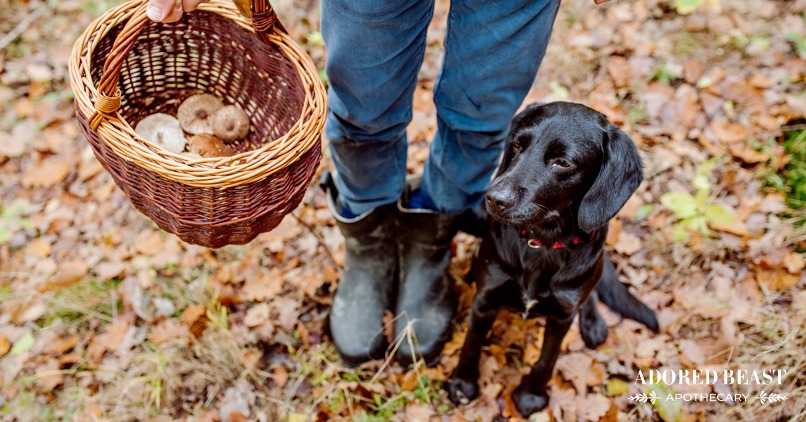Here at Adored Beast we’re all about feeding our animals fresh, whole foods that provide everything they need not just to survive, but to thrive. We see many foods as medicine, and can appreciate the power of the diet for health and longevity.
Mother Nature gives us the tools – we just need to know how to use them.
So, where do mushrooms fit on that list? Can dogs eat mushrooms? Are mushrooms good for dogs? Do they provide any benefit health-wise, or should they be avoided and kept for human-only consumption?
Can Dogs Eat Mushrooms?
Can dogs eat mushrooms? That’s a complex question.
Mushrooms are complicated. Some mushrooms, like those considered medicinal, are amazing, and can provide a ton of health benefits. Others, like your garden variety button mushroom, are also harmless, and can even provide some nutritional benefits. Then there are others that, just as you would avoid them, should be avoided by your dog at all costs.
Next, of course, you have to know how to feed them – should you give them raw, cook them, or buy a mushroom product that’s been processed?
Sounds complicated…
Don’t worry, we’ll fill you in.
Culinary Vs. Medicinal Mushrooms
First, will start with the good ones.
Culinary Mushrooms
Culinary mushrooms are mushrooms you cook with. These range from the basic button mushroom to fancier ones like cremini mushrooms. And many of these culinary mushrooms are safe for your dog. Mushrooms sold in large and chain grocery stores are generally safe for dogs to eat.
These include:
- White button
- Portobello
- Cremini
- Porcini
- Chanterelle
Many of these contain vital nutrients that are great to add to your dog’s diet:
- Amino acids
- Vitamins A and B
- Copper
- Enzymes
- Folate
- Iron
- Magnesium
- Manganese
- Niacin
- Riboflavin
- Phosphorus
- Selenium
- Thiamine
- Zinc
Mushrooms are also high in fiber, some are high in protein, and some even contain antioxidants.
But these beneficial properties are not just in culinary mushrooms…
Medicinal Mushrooms
As you can probably guess from the name, medicinal mushrooms have been found to have exceptional medicinal properties compared to their culinary cousins. They’ve been used for thousands of years in cultures around the world, particularly in Asian countries.
While they contain all of those healthy nutrients we mentioned above, they also contain a powerhouse of other therapeutic properties, including:
- Beta-glucans
- Polyphenols
- Polysaccarides
- Triterpenes
And it’s these properties that give medicinal mushrooms their power, power that research shows can help with everything from immune modulation to gut health to cancer.
The mushrooms on this list include:
- Turkey tail
- Chaga
- Reishi
- Shiitake
- Maitake
- Cordyceps
- Lion’s mane
And yes, these are all safe for your pup.
Can Dogs Eat Mushrooms from the Wild?
You’re out for a hike in the forest and your pet is nosing around some old logs, sniffing away. You look down and spot a growth of mushrooms on a dead log. Is it ok for your dog to have a mid-hike snack?
Unless you have an extensive background in foraging and can accurately (and with 100% confidence) name that mushroom and know its components, keep your dog away.
Why? While many mushrooms are safe – even good – for dogs, about 100 mushroom species are considered poisonous, and those are tremendously toxic. And that’s not just for dogs – these are no good for humans either.
Here are a few of the most common poisonous mushroom species – these types of mushrooms need to be avoided:
- Amanita phalloides (death cap)
- Galerina marginata (deadly Galerina)
- Amanita gemmata (jeweled death cap)
- Amanita muscaria (fly agaric)
- Gyromitra species (false morel)
- Gyromitra caroliniana (Big reds)
- Inocybe species
- Clitocybe dealbata
If your dog accidentally eats a mushroom you’re not 100% sure about, consider it toxic until you’ve been able to prove otherwise.
Some signs of toxic mushroom ingestion include:
- Excess salivation
- Lethargy or sedation
- Tremors
- Seizures
- Elevated heart rate
- Liver failure
- Vomiting/diarrhea
Identifying toxic mushrooms can be a challenge, even for experienced foragers. With so many different species, some of which look very similar, you need to be sure. If your dog eats one during a woodland jaunt, don’t waste time trying to identify the species. Our recommendation is to contact your trusted veterinarian right away and follow their advice.
How to Add Mushrooms to Your Pet’s Diet
When it comes to medicinal mushrooms, the easiest (and best) way to add them to your dog’s diet is with a mushroom supplement made especially for pets.
Many companies out there produce very high quality products from mushrooms. The way that a mushroom is processed impacts the benefits the end product has.
Powders vs. Liquid Extracts: Compared to most powders, double liquid extracts contain a range of full spectrum compounds. This includes both water-soluble compounds (polysaccharides) and alcohol-soluble compounds (triterpenoids). And since we know that it is this full range of compounds that provides the benefits of turkey tail mushrooms, our advice is always to look for a double or dual extraction liquid extract.
Find a product from a company you trust and follow dosing directions for that specific product.
For non-medicinal (culinary) mushrooms, introduce them gradually to prevent stomach upset. In general, fresh or dried mushrooms contain more beneficial nutrients than canned mushrooms, so try to go that route. As for raw or cooked, dogs don’t create the enzymes needed to break down the fiber and some of the sugars found in mushrooms, so lighting steam fresh mushrooms first to help aid in digestion. Then, just add a few slices to your dog’s dinner, just as you would any other fresh food!
Mushrooms, both culinary and medicinal, can be a great addition to the diet or supplement routine for any dog. They provide vital nutrients and some even give a healthy power boost. Just remember, do your research, and stay away from the wild ones… Enjoy!












